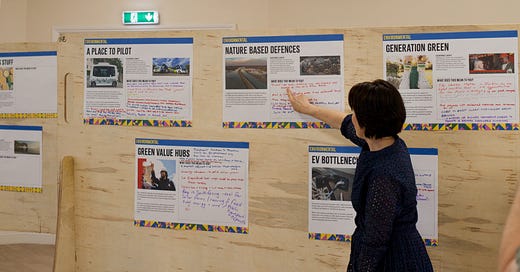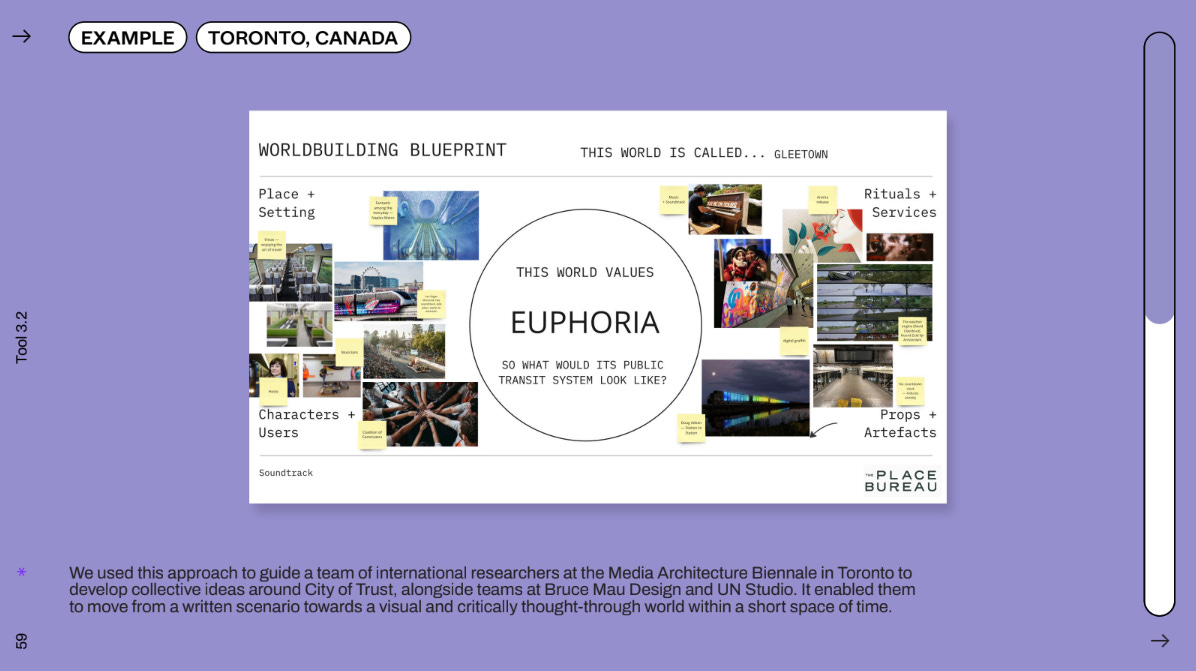WHAT Is a Futures Workshop?
A futures workshop is a collaborative, creative process designed to help diverse groups imagine, explore, and plan for the future of a place. These workshops allow us to move beyond the present, unlocking innovative, shared visions rooted in both creativity and pragmatism.
As we discussed in the previous article about Place Foresight, we believe the power to plan for the future is an essential and underutilised part of placemaking, where projects can take years or even decades to come to life, which is why we developed our Collaborative Place Futures Toolkit – a set of practical exercises for anyone who wants to design for the future collaboratively.
These tools take complex, abstract ideas about the future and make them tangible, accessible, and actionable. Participants imagine scenarios, create visual frameworks, and map out shared opportunities.
Most importantly, a Futures Workshop balances imagination with practicality. While creativity drives the process, the goal is to produce clear, actionable outcomes.
What kind of tools do we use in a futures workshop?
Our Collaborative Place Futures Toolkit draws together tools from filmmaking, trends forecasting, service design, community engagement and meditation to name a few. Some of our favourite tools include:
Signal Spotting: We may ask participants to do a bit of homework, bringing along a signal of change that they’ve noticed that might impact the future of their place - this might be backed up by an article in the newspaper, an academic journal, a blog or a local messageboard.
Futures Wheel: A tool that helps us to think about the consequences of a particular action and then the ripple effect of each of those consequences. It helps participants to see how big an impact a small change could have.
Worldbuilding blueprint: Inspired by filmmaking, we ask participants to build out a ‘world’ based around a scenario, and populate it with imaginary characters, places, objects and rituals. It helps us to add colour and texture to abstract future scenarios.
WHY Futures Workshops Are Essential
In a world where immediate priorities often dominate decision-making, futures workshops offer space to step back, look ahead, and imagine new possibilities. They help teams move from a reactive mindset to a proactive one, identifying opportunities, addressing challenges, and planning with greater purpose. Building up ‘Futures Literacy’ is a core tenet of what we do at The Place Bureau — we aim to equip stakeholders and communities with the skills and confidence to anticipate what’s to come.
Breaking Down Silos Through Collaboration
Futures workshops are powerful tools for breaking down silos, encouraging diverse stakeholders—designers, community members, policymakers, and business leaders—to collaborate.
According to the Brookings Institution, cross-sector collaboration in urban planning improves alignment and generates solutions that are 35% more effective in meeting community needs.
A study by PwC found that organisations fostering collaborative problem-solving outperform their peers by 20% in developing innovative strategies.
Creating Shared Ambitions and Place Visions
One of the key strengths of futures workshops is their ability to build a shared vision for the future. They align the long-term aspirations of different groups, ensuring that everyone is moving in the same direction—whether designing a new neighborhood or reimagining a city square.
Why does this matter? Because alignment leads to more robust, resilient outcomes.
Research from the OECD highlights that cities with long-term, shared visions are 40% more resilient in the face of economic or environmental challenges.
A report from Nesta emphasises that shared visioning processes help reduce stakeholder conflict by up to 30%, fostering a stronger sense of ownership.
Moving Beyond Immediate Concerns
In today’s fast-paced world, immediate concerns and short-term priorities often dominate decision-making. Futures workshops offer an opportunity to step back, think ahead, and imagine transformative possibilities that might otherwise be missed.
This shift from a reactive to a proactive mindset helps teams identify opportunities, anticipate challenges, and make purpose-driven decisions that lead to long-term value.
A study by Harvard Business Review revealed that organisations that plan for the future see a 33% increase in long-term growth and innovation.
The World Economic Forum found that future-focused planning is crucial for adapting to societal and environmental disruptions, with 65% of leaders citing it as essential for success.
At The Place Bureau, we encourage participants to:
Think big: What bold ideas could change the trajectory of this place?
Explore possibilities: How might demographic shifts, technology, or climate change reshape this place?
Plan for resilience: What will ensure this place thrives through uncertainty?
HOW are The Place Bureau helping to shape the future?
Place Futures Toolkit
The Collaborative Place Futures Toolkit, developed by The Place Bureau, enables anyone to get involved in collectively defining and designing places for tomorrow. The project was initiated as part of the Arts University Bournemouth’s Innovation Lab and builds upon years of collective experience, guiding communities to shape future visions.
The toolkit is a highly flexible kit of parts to allow teams to shape a process according to their project scope, community, aims and content, and is also supported by a fun and accessible card game.
The toolkit is broken down into 4 stages. Each leg of this journey has a unique part to play - from warming up, to gathering information, getting creative and putting ideas into action.
Since launching the Beta version of the Collaborative Place Futures Toolkit, we're proud to have seen it in use by educators, urbanists and communities around the world including:
○ The Bartlett: UCL postgraduate module and short course ‘Civic Design: Community Participation and Co-production’
○ Great Rivers Greenway, Missouri
○ Municipal Arts Society, NY
○ Diagol City EU
○ Fondazione Innovazione Urbana, Bologna
“I am convinced that we need to train teams more to think about the future, to find new solutions but alongside codesgin processes, alongside collective intelligence, we need planning ability to make things happen: your tools are going in this direction”
Michele Dalena, Fondazione Innovazione Urbana
Futures Lab
Swiss furniture brand USM, as we know it today, was established in the 1960’s by Paul Schärer Jr and Fritz Haller on a vision of future flexibility and innovation, designed to evolve with a rapidly developing business. In 2024 we are seeing rapid development across all aspects of our day to day lives, in everything from climate impact, to social impact, the economy, Artificial Intelligence and beyond. Fondation USM established 'Futures Lab' to explore, envision and advocate for solutions that will tackle the challenges we face today and help build a brighter and more resilient future.
The Place Bureau collaborated with design practice For Everyday Life to shape an innovation programme, informed by our Collaborative Place Futures Toolkit. The team assembled an advisory panel drawn from a global network of academics, founders, industry leaders, creatives, technologists and innovators and worked with them to shape up future world scenarios. These scenarios informed briefs for four design studios to explore. The programme culminated in an inspiring and collaborative event at the USM headquarters in Munsingen, Switzerland where the outcomes were shared with the advisory panel and plans for future funding and support were considered.
Where Imagination Meets Action
At their core, futures workshops are about imagining a better future – and then planning to make it real. They unlock innovation, bring people together, and align long-term goals, ensuring that ideas are both visionary and actionable. How are your organisation or community planning for the future? Do you have a shared vision, and how far into the future does it stretch? What methods are you using to stretch your imagination?








